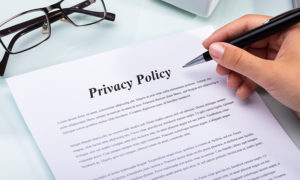Maintaining HOA records security is of prime importance to any homeowners association. Navigating the ins and outs of data protection, though, can be confusing. Learn how to safeguard sensitive information here.
How to Maintain HOA Records Security
Homeowners associations deal with all sorts of information on a daily basis, some of which are confidential or sensitive. As such, it is imperative for each association to maintain HOA records security. Such an undertaking is often easier said than done, though. If your HOA does not know where to begin, consider the following steps:
1. Check State Laws
The first thing you must do is check federal, state, and local HOA privacy laws. Doing so will help your HOA identify which homeowner personal records must remain protected. It is important to remember that publicly available information does not fall under personal information.
Personal information typically includes a homeowner’s name, driver’s license number, and social security number. It can also be the homeowner’s financial information, such as credit or debit card number and account number. Other personal information may also include:
- Professional information
- Medical information
- Family information
- Security codes or passwords
- Government-issued IDs
2. Develop an Information Policy
 The next thing your association must do in an effort to maintain HOA records security is to develop an information policy. This policy should consist of a detailed description of what type of information is deemed confidential. Board members, management personnel, and employees must know about this policy. The policy should also include the proper way to disclose information to homeowners.
The next thing your association must do in an effort to maintain HOA records security is to develop an information policy. This policy should consist of a detailed description of what type of information is deemed confidential. Board members, management personnel, and employees must know about this policy. The policy should also include the proper way to disclose information to homeowners.
3. Destroy Unnecessary Confidential Information
An HOA does not need to keep every piece of homeowner information. For instance, if for any reason a homeowner submitted paperwork to the association which includes their social security number, the HOA must dispose of the record as soon as it is no longer needed. This usually means performing one or a combination of the following:
- Shredding all physical copies of the records
- Permanently deleting the confidential information from digital files or programs
- Redacting the personal information from records
4. Prepare for Possible Breaches
Although you can implement policies to prevent a breach of confidential information, they are not foolproof. Make it a part of your plan to prepare for possible breaches. See to it that your association has up-to-date records of all homeowners’ contact information. This way, you can easily get in touch with and inform them. You must also decide whether to let them know of the breach as soon as it happens or after you have fixed the issue. Lastly, consider purchasing liability insurance.
How Long Does an HOA Need to Keep Records?
When it comes to HOA records maintenance and storage, a common question many associations ask is how long records must be kept. The answer is, it depends on the nature of the record. Personal homeowner information must not be kept indefinitely. They must either be redacted or destroyed when they are no longer needed.
Examples of records that must be kept permanently include the following:
- Meeting minutes
- Original governing documents
- Deeds
- Insurance policies
- Annual corporate tax returns
- Annual financial statements and general ledgers
- Blueprints
- Architectural change requests
In general, though, if the documents do not fall under permanent records, they must be retained for four years.
Understanding the Risks of Data Management and Storage
Although HOA record keeping is an essential part of managing an association, there are possible risks involved. Knowing what these risks are can help your HOA prepare for potential breaches in security.
1. Physical Files
Storing HOA data in physical copies has been the standard for decades. But, hard copies of records do not last forever. Time can inflict irreversible wear and tear on paper and cause the ink to fade. Furthermore, it is very easy to steal or accidentally destroy paper records. Natural disasters can also prove detrimental. Fires and floods, for instance, can cause damage beyond repair. Not to mention the amount of physical storage space you will need to keep records for a long time.
2. Digital Files
 Many homeowners associations are making the switch to digital data management and storage. Managing HOA records using a digital platform is just plain easier and more convenient. However, that does not mean it is completely risk-free. On the contrary, although digital files are easier to maintain, they are also easier to copy and steal. Some platforms have security protocols against this, though.
Many homeowners associations are making the switch to digital data management and storage. Managing HOA records using a digital platform is just plain easier and more convenient. However, that does not mean it is completely risk-free. On the contrary, although digital files are easier to maintain, they are also easier to copy and steal. Some platforms have security protocols against this, though.
Perhaps one of the most well-known risks with digital files is cyberattacks. If your computer or data management program is connected to the internet, it is prone to hacking. If you subscribe to a provider, they may experience leaks or data breaches themselves, putting your information in danger. Of course, there are many security protocols designed to fight such violations, and every reputable data company has them in place.
Responding to an HOA Data Security Breach
As the saying goes, prevention is better than a cure. But, even after taking preventive measures, your HOA could still experience a data security crisis. If that happens, your association must know what to do to effectively manage the situation. These are the steps you must take in case of a data breach:
- Find out the scope of the data security breach
- Determine what controls and protocols are in place to restore the system’s credibility
- Promptly inform the homeowners whose information have been compromised and let them know what steps the association is taking to help prevent identity theft
- Avoid negative publicity directed at the HOA and its members by providing helpful information to authorities in a timely manner
- Contact your insurance provider as soon as possible to discuss what actions must be taken to prevent additional losses
- Check and comply with required laws and regulations on crisis management
*Some state laws, like in California, dictate that the notification may be delayed by a law enforcement agency if it interferes with a criminal investigation.
Avoiding Potential Consequences
Maintaining HOA records security is an integral part of running an association. It rests on the HOA board or management team’s shoulders to safeguard records, especially if they are confidential or contain personal information. It is also important to know how to respond to potential breaches in security. Failure to uphold these duties can result in a number of consequences, such as identity theft, lawsuits, fines or penalties, and a tainted reputation.
If your association needs help managing information and storing records, contact Elite Management Services. Call us today at (855) 238-8488 or shoot us an email at help@emspm.com to find out how we can help you.
RELATED ARTICLES:
- What To Do Before Amending HOA Governing Documents
- HOA Emergency Preparedness Plan: How To Plan For Emergencies
- HOA Legal Responsibilities Every Homeowner Should Know







